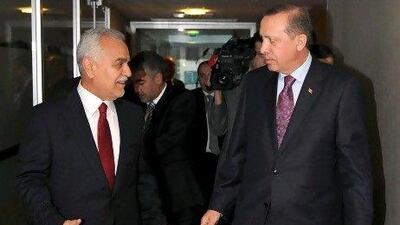ISTANBUL // Analysts expect tensions between Turkey and Iraq to continue to rise because they are part of a growing "Cold War" between Shiite and Sunni Muslim camps in the region.
Late Monday, the Iraqi vice-president, wanted by Baghdad on charges of running death squads but enjoying red carpet treatment while staying in Turkey, fanned the flames by accusing his government of steering the country towards sectarian confrontation.
Tareq Al Hashemi's comments came before he met with Ahmet Davutoglu, the Turkish foreign minister, last night. They were the latest sign that the political crisis in Iraq is part of a wider problem in the region, analysts said.
"There is growing polarisation" between a Sunni and a Shia camp," said Celalettin Yavuz, deputy director of the Turkish Centre for International Relations and Strategic Analysis (Turksam), a think tank in Ankara.
Iran and Syria have been backing the Shia side with Russia in the background. Turkey and the Gulf states have been supporting the Sunnis, who are also backed by the United States and Israel, Mr Yavuz said. "The fronts are becoming clearer, just like in the Cold War," he said in an interview yesterday.
The withdrawal of the United States from Iraq almost 10 years after the invasion to topple Saddam Hussein contributed to rising tensions between Shiites and Sunnis in the country, he added.
Turkey, a secular but mostly Sunni nation, blames the Shiite-led government of Nouri Al Maliki, the Iraqi prime minister, for growing tensions inside Iraq, while Mr Maliki accuses Turkey of meddling in its internal affairs.
Mr Al Hashemi has been in Turkey since April 9 where he has held talks with Recep Tayyip Erdogan, the Turkish prime minister, and other Turkish officials.
"I am gravely concerned about one side taking over power and pushing all other sides away," Mr Al Hashemi said on Monday during a visit to the Turkish resort town of Yalova, south of Istanbul, according to Turkish news agency reports. "The most worrying issue in Iraq at the moment is that political problems may turn into sectarian clashes," he added.
In December, Mr Al Hashemi was accused in by Iraq's judiciary of organising bomb attacks. He said Mr Erdogan was right to address the danger of sectarian strife in statements last week, which Baghdad condemned as efforts to interfere in its domestic affairs.
Mr Erdogan accused Mr Maliki of stoking conflict between Shiite Muslims, Sunni Muslims and Kurds through "self-centred" behaviour. In response, Mr Maliki said Turkey was becoming a "hostile state" with a sectarian agenda.
On Monday, the Turkish ambassador to Baghdad was summoned to the Iraqi foreign ministry to hear Iraqi complaints about the Turkish stance, but the move did little to calm the waters. According to a Turkish diplomat, who spoke on condition of anonymity yesterday, the ambassador, Yunus Demirer, "refused the oral protest and explained our views on the issue".
Analysts said chances for the row to be resolved quickly were slim.
"The crisis in Iraq takes on a regional dimension," Mehmet Sahin, a political scientist at the Gazi University in Ankara, said yesterday. "Tensions will rise further."
Mr Sahin said Mr Maliki's effort to take control of Iraq's security apparatus and the growing influence of Shiite power Iran over Iraq were worrying trends for Turkey. At the same time, Iran and Mr Maliki were critical of Turkey's position in the conflict in Syria. Ankara has been siding with the Syrian opposition and calling for the resignation of Bashar Al Assad, the president, who has been trying to crush an uprising against his regime.
The confrontation coincides with a Turkish policy shift triggered by the Arab Spring uprisings, Mr Sahin said. Ankara decided to turn away from authoritarian regimes and side more with popular demands of democracy, he said. "Maliki didn't like this; Assad didn't like this, and Iran didn't like this either."
Mr Davutoglu, the Turkish foreign minister, has warned several times in recent months that a "Cold War" between Shiites and Sunnis could start in the Middle East. "There are those who want to create a regional Cold War," he said in January. "Sectarian tensions would be suicide for the whole region."
"At the moment, players are moving away from a solution, not towards it," Mr Yavuz of the Turksam think tank said, adding bomb attacks were killing civilians in Iraq almost every day.

